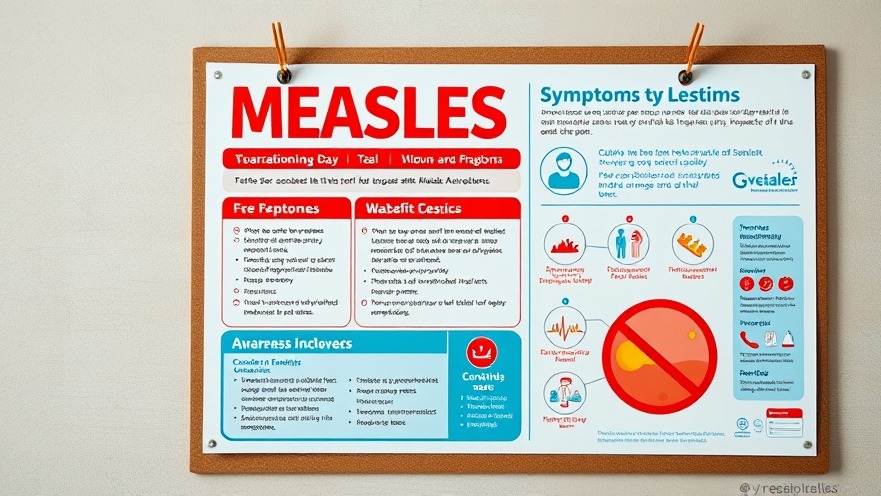
A Growing Concern: The Rise of Measles Misinformation
The impact of misinformation on public health has never been more critical, especially with the current measles outbreak hitting 27 states and claiming innocent lives. According to a recent KFF survey, the knowledge gap surrounding the measles vaccine is widening, particularly between political party lines. It's alarming that many parents, especially those who lean Republican, are unaware of the spike in measles cases this year.
Dissecting the Survey Findings
The KFF survey revealed that about two-thirds of Republican parents are oblivious to the ongoing measles epidemic. This figure starkly contrasts with just about one-third of Democratic parents who have grasped the reality of this health crisis. As the vaccine skepticism continues to rise, particularly among GOP respondents, it raises essential questions about the future of public health.
Vaccination vs. Disease: The Polarizing Debate
The findings from the KFF survey show a disturbing trend: the skepticism towards vaccines is more pronounced among Republicans, with one in five believing that the measles vaccine is more harmful than the disease itself. In comparison, this notion is held by just one in ten Democrats. Such diverging perspectives are not merely differences in understanding but signify the larger fight between science-backed health information and misinformation.
Understanding the Roots of Misinformation
Not just limited to vaccine efficacy, misinformation has permeated various aspects of healthy living. Approximately 30% of parents mistakenly believe that vitamin A could prevent measles infection. This myth can be traced back to statements made by public officials, including the Secretary of Health and Human Services, who has sowed seeds of doubt around the safety of vaccines.
The Impact of Adult Beliefs on Children’s Futures
What’s even more concerning is the impact these beliefs may have on future generations. The rise in vaccination hesitation due to misinformation can lead to increased disease prevalence among children. As vaccination rates decline, diseases once considered under control could resurface, undermining all progress in public health.
What Can Be Done?
To combat misinformation, it is imperative that trustworthy sources provide clear, consistent messages about the importance of vaccination. Advocating for accessible health information can alleviate fears and misconceptions, ideally resulting in an informed public that prioritizes health and wellness.
Moving Towards Better Health
As we foster discussions about vaccines, it remains essential to connect the dots between general health and wellness. Building robust immune systems through proper nutrition, physical activity, and mental health support is vital for safeguarding not just individual health but community health as well. Emphasizing immune-boosting foods and a well-rounded diet can pave the way to healthier lifestyles.
The Role of Community Support in Health Education
Local communities can play a crucial role in diffusing health misinformation. Community leaders and organizations should step forward to share credible information and resources that promote vaccine awareness. The benediction of local voices lends authenticity to health campaigns, often overshadowing misinformation that rampant social media promotes.
Final Thoughts on Misinformation and Health
In these tumultuous times where misinformation is on the rise, it is our collective responsibility to stand against it. Listening to experts, engaging in constructive conversations, and steering public discourse towards factual information can help foster a culture of wellness. By prioritizing health and wellness, we create environments where future generations can thrive, free from preventable diseases.
We encourage you to explore ways in which you can contribute to community health initiatives and engage in discussions that promote education around vaccinations and overall wellness.
 Add Element
Add Element  Add Row
Add Row 



 Add Row
Add Row  Add
Add 


Write A Comment